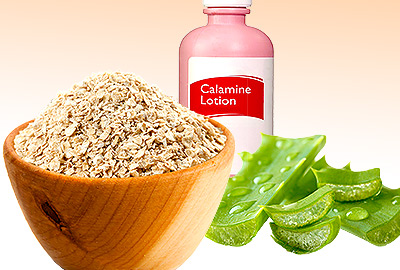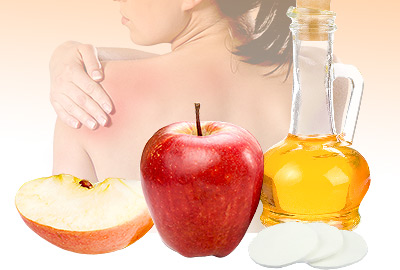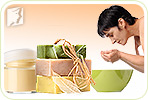Itchy skin, medically known as pruritus, can make it difficult for women to function normally, leaving many desperate for immediate relief. Fortunately, there are numerous easy and effective approaches to getting rid of the itch during menopause and enjoying healthy and beautiful skin for years to come.
Continue reading to find out how to treat itchy skin so that you can finally stop scratching and start enjoying your life!
Three Approaches to Treating Itchy Skin
When searching for the right itchy skin treatment, women can choose from among three approaches: (1) Lifestyle changes, (2) Alternative medicine, and (3) Conventional medicine. They are generally encouraged to start with the most natural options and move on to conventional treatments if medically necessary.
Lifestyle Changes for Itchy Skin Treatment

The first level of treatment consists of making healthier lifestyle adjustments, which carries the least amount of risk, but calls for the strongest will. Nevertheless, it can bring tremendous benefits to arrhythmia treatment.
Nutritious Diet
Following a healthy menopausal diet can be beneficial for managing itchy skin and improving women's overall health during menopause. Women should opt for regular, well-balanced meals composed with colorful and fiber-rich varieties of vegetables, fruits, and whole grains, while giving preference to the following:
- Phytoestrogens, or plant estrogens,help promote hormonal balance in the body to relieve itchiness and other symptoms of menopause.
Soy, tofu, tempeh, flax
- Iron deficiency can lead to the development of itchy skin and subsequent rashes in women of various ages.1
Broccoli, chicken, eggs, apricots, spinach
- Omega-3 fatty acids consumption has been found beneficial for relieving itchy skin due to psoriasis.2
Salmon, flax, chia, walnuts, edamame
- Probiotics have shown promise for reducing atopic dermatitis, although further research is needed to confirm those results.3
Yogurt, kombucha, sauerkraut, kimchi
Since itchy skin may also be caused by allergic reactions to certain foods, it is important to keep a food diary to take note of potential triggers.4
Regular Exercise
Since it is common to experience mild itching while exercising due to an increased body temperature, women may be tempted to avoid physical activities to control their symptoms. However, staying active can bring significant improvements in balancing hormones and reducing bothersome symptoms of menopause.
Amount: Women are advised to exercise moderately for 30 minutes a day, most days a week, or vigorously for 15 minutes a day, five times a week.5
Type: Women are advised to combine aerobics - like jogging or swimming - with muscle-strengthening workouts, like yoga or light weights, while still keeping it fun and choosing sports they enjoy.
Useful tips: To control the itchiness, it is recommended to exercise outdoors or in well-ventilated spaces, wearing breathable, loose fabrics. Starting slowly and gradually building up is key.
Precautions: Although rare, itchy skin can also result from a life-threatening reaction called exercise-induced anaphylaxis, requiring immediate medical attention.6 As such, low to moderate workouts are best.
Wholesome Habits
Besides conscious eating and regular exercising, women can make wholesome choices in their day-to-day lives. These habits can quickly relieve symptoms, regulate hormones, and allow women to take control over their health. Some of the best recommendations for itchy skin treatment are as follows:
Lowering stress can be a great approach to treating itchy skin as being stressed or anxious can trigger or worsen the itch.7 Consider mindfulness, biofeedback, or conscious breathing.
Applying cool compresses or taking herbal baths, including colloidal oatmeal, may bring immediate but temporary relief from itchy skin.8
Keeping skin well-moisturized with lotions, preferably fragrant-free, and hypoallergenic products made with natural ingredients - such as olive, jojoba, or coconut oil - can also prove provide respite.
Identifying triggers in order to avoid their exposure is a great tactic for treating and preventing itchy skin. Besides food or fabrics, other triggers can include temperature, cosmetics, and more.
Quitting addictions to nicotine and excessive alcohol drinking is an important step in promoting hormonal balance and relieving menopause symptoms, such as itchy skin.
Alternative Medicine for Itchy Skin Treatment

Alternative approaches to how to relieve itchy skin consist of a rich variety of options, with herbal supplements being the most popular. It is also the only one that addresses the underlying cause of menopause symptoms, hormonal imbalance.
There are two types of supplements that can be considered for pruritus treatment: phytoestrogenic and hormone-regulating supplements.
Phytoestrogenic Supplements
Phytoestrogenic supplements, like black cohosh, contain phytoestrogens, which are plant-based compounds that function like estrogen in the human body. When used short-term, they can replenish estrogen levels and relieve itchiness. However, their long-term use is not recommended because they can make the body less capable of producing its own hormones, thus eventually leading to a further state of imbalance.
Hormone-Regulating Supplements
Hormone-regulating supplements, like Macafem, do not supply the body with outside hormones. Instead, they act directly on the endocrine glands by nourishing them with beneficial alkaloids and stimulating them to improve their hormone production. By doing this, they help balance hormone levels and alleviate symptoms of an imbalance. They are considered one of the safest and most effective itchy skin treatments that can be taken long-term.
From Nature and Health Magazine, Dr. Chacon says:
"Macafem's nutrients help restore natural hormones in women. Unlike hormone drugs, which are basically resumed in taking synthetic hormones, Macafem acts totally different in your body. It nourishes and stimulates your own natural hormone production by inducing the optimal functioning of the pituitary and endocrine glands." Click on the following link to learn more about Macafem.
Combining lifestyle adjustments with herbal supplements is often the most natural and long-lasting approach to restoring hormonal balance and treating itchy skin. However, severe symptoms may require more conventional treatments.
Conventional Medicine for Itchy Skin Treatment

Treatments on the third level involve the highest cost, and some may come with high risks of side effects. However, they are a necessary component of the treatment plan if itchy skin negatively impacts women's quality of life.
There are three types of conventional itchy skin treatments to consider: medications, light therapy, or psychotherapy.
Medications
Depending on the underlying cause, medicine for itchy skin may work by relieving symptoms or resolving their root cause. They include the following:
Topical ointments, such as those containing corticosteroids, menthol, or capsaicin, may be used to relieve itchy skin. Topical anesthetic creams, like pramoxine, may be used, too.
Oral medications, like antihistamines and antidepressants, may be beneficial for reducing some types of itchiness.
Other cause-specific medications may include those to treat parasitic infections, diabetes, and liver, thyroid, and kidney diseases, among others.
Hormone replacement therapy (HRT) used to be the most widely prescribed treatment for menopausal symptoms, including itchy skin. While quick and highly effective, HRT has been found to increase the risk of serious side effects and put women's health at risk, as shown in the studies below.
Therapies
Other therapies may also be considered for the treatment of itchy skin, including the following:
Phototherapy. Also called light therapy, it may be a helpful itchy skin treatment due to psoriasis, atopic dermatitis, and other inflammatory skin diseases.
Psychotherapy. Since up to 10% of itchy skin cases have emotional causes, women with depression, anxiety, or trauma may benefit from undergoing psychotherapy.11
These three levels of pruritus treatment are not mutually exclusive. Women may find that some approaches might be more beneficial at various stages of the menopausal transition than others. Nevertheless, many opt to combine lifestyle changes with herbal supplements for optimal, risk-free results the natural way.
A Safe Way of Treating Itchy Skin
Implementing Lifestyle Changes:
- Consuming foods rich in phytoestrogens, iron, and omegas
- Keeping up with regular exercise for 150 minutes a week
- Practicing stress-relief techniques of yoga or slow, deep breathing
- Relieving the itch with herbal remedies and natural lotions
And Taking Herbal Supplements:
- Phytoestrogenic herbal supplements, like black cohosh
- Or natural hormone-regulating supplements, like Macafem
Sources
- Dermatology Practical & Conceptual. (2016). Diet and eczema: a review of dietary supplements for the treatment of atopic dermatitis. Retrieved July 14, 2020 from https://www.ncbi.nlm.nih.gov/pmc/articles/PMC5006549/
- Expert Opinion on Pharmacotherapy. (2011). Therapy of Pruritus. Retrieved July 14, 2020 from https://www.ncbi.nlm.nih.gov/pmc/articles/PMC2885583/
- Frontiers in Medicine. (2018). The Antipruritic Effect of Phototherapy. Retrieved July 14, 2020 from https://www.ncbi.nlm.nih.gov/pmc/articles/PMC6287194/
- Health Direct. (2019). Itchy Skin. Retrieved July 14, 2020 from https://www.healthdirect.gov.au/itchy-skin
- Medline Plus. (2020). Itching. Retrieved July 14, 2020 from https://medlineplus.gov/itching.html
- National Institute on Aging. (n.d.). Skin Care and Aging. Retrieved July 14, 2020 from https://www.nia.nih.gov/health/skin-care-and-aging
- The Journal of Clinical and Aesthetic Dermatology. (2014). Diet and Dermatitis: Food Triggers. Retrieved July 14, 2020 from https://www.ncbi.nlm.nih.gov/pmc/articles/PMC3970830/
Footnotes:
- Iron. Mayo Clinic. (2018). Itchy Skin (Pruritus). Retrieved July 14, 2020 from https://www.mayoclinic.org/diseases-conditions/itchy-skin/diagnosis-treatment/drc-20355010
- Omegas: Journal of the American Academy of Dermatology. (2015). Diet and Psoriasis: Part 3. Role of Nutritional Supplements. Retrieved July 14, 2020 from https://www.ncbi.nlm.nih.gov/pmc/articles/PMC4134971/
- National Eczema Association. (n.d.). Probiotics: The Search for Bacterial Balance. Retrieved July 14, 2020 from https://nationaleczema.org/search-bacterial-balance/
- Better Health Channel. (2017). Food allergy and intolerance. Retrieved July 14, 2020 from https://www.betterhealth.vic.gov.au/health/conditionsandtreatments/food-allergy-and-intolerance
- American Heart Association. (2017). The American Heart Association Diet and Lifestyle Recommendations. Retrieved July 14, 2020 from https://www.heart.org/en/healthy-living/healthy-eating/eat-smart/nutrition-basics/aha-diet-and-lifestyle-recommendations
- Chronic Diseases and Translational Medicine. (2015). Primary osteoporosis in postmenopausal women. Retrieved July 14, 2020 from https://www.ncbi.nlm.nih.gov/pmc/articles/PMC5643776/
- Neuroscience & Biobehavioral Reviews. (2018). The Vicious Cycle of Itch and Anxiety. Retrieved July 14, 2020 from https://www.ncbi.nlm.nih.gov/pmc/articles/PMC5845794/
- Journal of Drugs in Dermatology. (2007). Colloidal oatmeal: history, chemistry and clinical properties. Retrieved July 14, 2020 from https://pubmed.ncbi.nlm.nih.gov/17373175/
- JAMA. (2002). Risks and benefits of estrogen plus progestin in healthy postmenopausal women: principal results from the Women's Health Initiative randomized controlled trial. Retrieved April 22, 2020 from https://www.ncbi.nlm.nih.gov/pubmed/12117397
- The Lancet. (2019). Type and timing of menopausal hormone therapy and breast cancer risk: individual participant meta-analysis of the worldwide epidemiological evidence. Retrieved April 22, 2020 from https://www.thelancet.com/journals/lancet/article/PIIS0140-6736(19)31709-X/fulltext
- Last. Hippokratia. (2007). Pruritus in certain internal diseases. Retrieved July 14, 2020 from https://www.ncbi.nlm.nih.gov/pmc/articles/PMC2464269/



